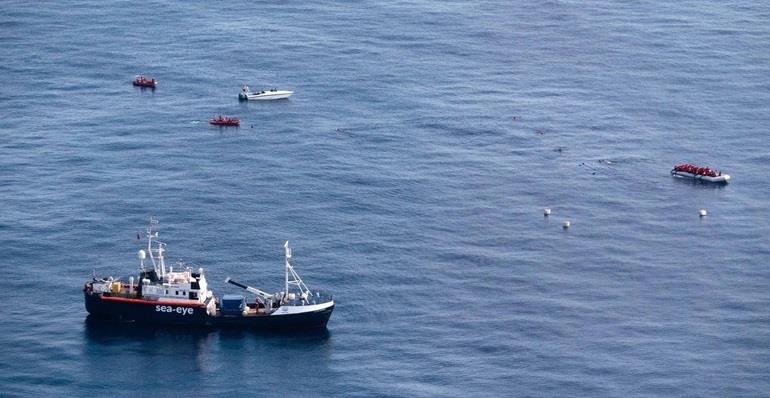A report by the EU Agency for Fundamental Rights (FRA) has revealed that between 2018 and 2019, 45 unaccompanied migrant children had been relocated to other EU member states under the Voluntary Relocation for People at Sea scheme.
The report titled "Relocation of unaccompanied children: applying good practices to future schemes" highlights the challenges and good practices in the implementation of different mandatory and voluntary relocation programmes since 2015.
It focuses on key steps of the relocation procedure from the moment a child is identified for relocation to the child's integration in the Member State of destination. The information provided is based on FRA's desk research and over 45 interviews with 72 representatives from national authorities, European institutions, international organisations and civil society organisations in 10 EU Member States; Belgium, Finland, France, Germany, Greece, Ireland, Italy, Malta, the Netherlands and Portugal.
The European Commission launched the first EU-wide relocation exercise (EU Relocation Malta Project - Eurema) in 2009 to support Malta in the light of increased numbers of arrivals.
Since 2015 the EU and its Member States have implemented three types of relocation schemes, which mainly concerned the transfer of asylum seekers from France, Greece, Italy and Malta.
The most recent scheme - the one which Malta belongs to - is called the Voluntary Relocation for People Rescued at Sea. This was set up between 2018 and 2019, and saw several Member States agree to relocate asylum applicants rescued at sea from Italy and Malta on a voluntary basis.

However, the report stated that pledges to accept unaccompanied children, across all schemes, were quite few, despite the high vulnerability of these individuals.
"Of the hundreds of unaccompanied children who have disembarked in Malta in recent years, only those rescued by NGO vessels are part of the voluntary relocation arrangements. During 2018 and 2019, 352 persons declared themselves children when they were disembarked in Malta from an NGO vessel and had to undergo age assessment. Of those, 93 were finally identified as children following the age assessment, and 45 unaccompanied children were relocated to other EU Member States," the report read.
This voluntary relocation mechanism is under the Malta Declaration which aimed to establish a more predictable and efficient temporary solidarity mechanism for persons rescued at sea in the central Mediterranean. The declaration has a number of standard operating procedures which indicated that relocation involves 15 actions in four phases (i.e. identification; interview and matching; checking by the state of relocation; decision and transfer). It also suggests that voluntary relocation for people rescued at sea should take place within four weeks.
According to some of FRA's interviewees, the scheme's procedures were so accelerated at first, that it did not always ensure child protection guarantees, such as appointing a guardian or assessing the best interests of the child, including any family links. However, in 2019 the situation changed once the European Commission took over the role of coordinating the relocation process after disembarkation operations, promoting a more coherent approach and a fairer distribution mechanism.
Additionally, with this scheme guardianship was not always ensured, because of the long delays in the appointment of a guardian. However, the report states that "from 2019, and thanks to a delegated act from the Ministry for the Family, Children's Rights and Social Solidarity, the Maltese reception authority (AWAS) was able to temporarily assign the role of guardian to one of its social workers."

Unfortunately, this appointment might still take weeks or months and the social worker is usually the same person who prepares a social report, on which the recommendation to relocate that child is based. Therefore, Maltese authorities are currently exploring how to apply in practice the recently adopted child protection law, which ensures that the guardian is an autonomous person who can act independently from AWAS, as the latter is also responsible for carrying out the age assessment, the report read.
Since 2019, the protocol has been that a social worker of AWAS assesses the child and compiles a social report. It is a brief overview looking especially at family links, in case the child should be reunified with family members instead of opting for relocation, the report adds.
The voluntary relocation for people rescued at sea in Malta and Italy were financially supported through the EU Asylum, Migration and Integration Fund (AMIF) with a €6,000 lump sum per applicant for the state of relocation. There is also additional support given to cover transfer costs through the International Organisation for Migration (IOM).
As a conclusion to this report, the FRA is calling on the EU and its Member States to consider four measures, starting with putting in place reasonable timelines for relocation of unaccompanied children that allow for the effective protection of the child. Additionally, they appealed for them to use eligibility criteria based on the child's vulnerability and protection needs and ensure that the child is supported by a legal guardian during all steps in the relocation. Finally, they asked for the prioritisation of maintaining family unity and facilitating family reunion if this is in the best interests of the child.
File photos